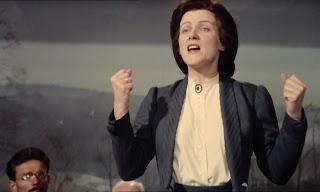
"I can't dance with you tonight and argue with you tomorrow."
Margarethe Von Trotta's Rosa Luxemburg (1986) takes on the monumental task of humanizing Germany's most famous socialist, a leader in the abortive 1919 Revolution still lionized by many leftists. It's a slow, cerebral film that engages its ideas with commendable clarity and lack of judgment.Polish-born Rosa Luxemburg (Barbara Sukowa) rises through the ranks of Germany's Left. Initially a mainstream socialist advocating democratic reform, she's eventually radicalized into a full-blown Marxist. She's stymied by more moderate colleagues who view her call to revolution premature at best, ill-advised at worst. Then World War I smashes Europe's social order into fragments, giving Luxemburg and her partner Karl Liebknecht (Otto Sanders) an opportunity to impose their dream upon Germany. But the new Weimar Republic sides with the military and conservatives to strangle the revolution in its crib.
Most of Rosa Luxemburg shows its protagonist giving fiery speeches, passing out pamphlets and agitating for revolution, elucidating Marxist ideals bold then and controversial still. As a Polish Jew, she doesn't really fit in among her adopted country's socialists, who endorse the Kaiser's war and decline radical action against autocracy. Thus she's viewed with suspicion even by her colleagues, finding their rhetoric of International Revolution more talk than action. She spends much of the movie in prison, enduring indignity with Gandhian stoicism while finding ways to spread her ideas.
If Von Trotta doesn't truly interrogate Luxemburg's politics, neither does she inundate viewers with reactionary atrocities or other dialectical devices. She's more interested in showing Rosa's strength in trying circumstances, her views growing more resolute with each slight, insult and imprisonment. Her words and actions nonetheless provide insight into her radical egalitarianism and revulsion at Bolshevik atrocities, an idealized socialism with little connection to reality. She applauds Liebknecht's goals while finding his revolution ill-timed and foredoomed. In Germany's case, the forces of reaction are too entrenched for Revolution to succeed, breeding a far greater tragedy.
The script schematically alternates Luxemburg's activism with her personal travails, especially her difficult romance with fellow Communist Leo Jogiches (Daniel Olbrychski) and friendship with Luise (Adelheid Arndt), the only person who can engage Rosa on a nonpolitical level. These scenes bleed into ideological arguments, rending a distinction moot: for a movie about Marxists, it's curiously eager to equate politics with personality, a Great Man (or Great Woman) approach that its own protagonists would have rejected. Perhaps it's for the best, as complexity makes for a richer experience than political posturing.
Barbara Sukowa (later of Von Trotta's Hannah Arendt) anchors the movie with a commendable performance. She balances Rosa's high-flown, unstinting idealism with a shrewdness that sets her apart from her more impulsive, opportunistic comrades. Whether mounting a soapbox, languishing in prison or arguing revolutionary tactics, Sukowa makes her character's arguments clear, forceful and compelling; along with her private shortcomings, she becomes a sympathetic, remarkably rich heroine.
Rosa Luxemburg might not satisfy viewers looking for action-packed spectacle or a Marxist diatribe. Despite its heroine's radical views, the movie becomes a character study of a strong woman, admirable in personality if not politics.

